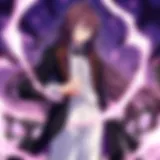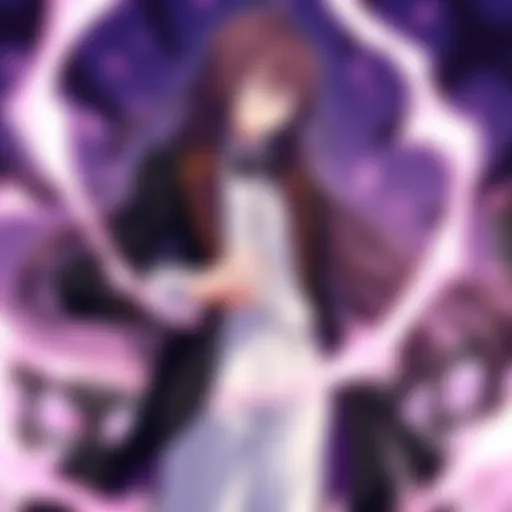An In-Depth Exploration of Yu Yu Hakusho's Legacy
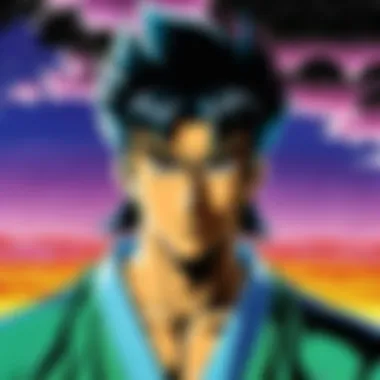

Intro
Yu Yu Hakusho stands as a pivotal work in the pantheon of anime and manga. Its story transcends mere entertainment, delving deep into themes of morality, friendship, and the afterlife. The series, created by Yoshihiro Togashi, first aired in the early 1990s and quickly amassed a dedicated following. This depth of narrative and character complexity contributes to its lasting legacy in both Japanese culture and worldwide.
Character Analysis
Overview of Character Development
At the heart of Yu Yu Hakusho are its well-crafted characters. Yusuke Urameshi, the bombastic and rebellious protagonist, showcases significant growth throughout the series. Initially depicted as a delinquent with little regard for life, Yusuke evolves into a more responsible and determined figure. This transformation is often marked by encounters that challenge his worldview and force him to confront the consequences of his actions.
Other characters, such as Kurama and Hiei, offer contrasting paths of development. Kurama, a fox demon with a human side, blends intellect and compassion. His journey illustrates the struggle between his dual nature and the responsibilities he bears. Hiei, on the other hand, represents raw power tempered by emotional scars. His dark past and fierce loyalty enrich the overall narrative, providing a nuanced understanding of the character's motivations.
Key Relationships and Dynamics
The relationships in Yu Yu Hakusho are intricate and serve to enhance character development. Yusuke’s bond with Kuwabara is a highlight of the series. Initially rivals, their eventual friendship is a testament to the power of camaraderie and mutual respect. The dynamic allows for a portrayal of masculinity that is both relatable and refreshing, showcasing that vulnerability can coexist with strength.
Furthermore, the relationships among the Spirit Detectives foster a sense of belonging. Each character brings unique strengths, shaping the group's dynamics. The camaraderie among Yusuke, Kurama, Hiei, and Kuwabara is central to the plot, as it emphasizes themes of teamwork and sacrifice.
Thematic Exploration
Central Themes and Messages
Yu Yu Hakusho explores a myriad of themes that resonate on multiple levels. The concept of redemption is prominent, as characters often grapple with their past mistakes and seek ways to atone for them. This theme is poignantly illustrated through Yusuke's journey, where each battle leads him closer to understanding his purpose.
Additionally, the series examines the nature of friendship and loyalty. The Spirit Detectives face numerous trials that test their bonds, ultimately reinforcing the importance of unity and support. The stakes of their missions often reflect the depth of their relationships, highlighting the emotional investment they have in one another.
Cultural Context and Influences
The cultural context of Yu Yu Hakusho is integral to understanding its impact. The series emerged during a time when anime began to take on more serious themes. This shift allowed for narratives that resonated not just with young audiences but also appealed to older viewers searching for depth in storytelling. The blending of action and thoughtful character arcs illustrates a significant evolution in the anime medium.
The spiritual elements, strongly rooted in Japanese mythology, add layers of cultural significance. The representation of the afterlife, supernatural battles, and moral dilemmas enriches the narrative and offers insight into Japanese thought on life and death.
"Yu Yu Hakusho not only entertains but also provides critical commentary on personal growth and societal values."
Epilogue
In summary, Yu Yu Hakusho represents a substantial contribution to anime, characterized by its complex characters and thematic richness. The exploration of friendship, redemption, and cultural relevance solidifies its place as a classic, appealing to both new fans and long-time enthusiasts alike. By understanding its character dynamics and thematic depth, one can appreciate the lasting impact of this beloved series.
Foreword to Yu Yu Hakusho
The significance of Yu Yu Hakusho in the realm of anime cannot be understated. This series emerged in the early 1990s, providing a unique blend of action, supernatural elements, and deep character development. Its impact reaches far beyond just entertainment; it shaped industry standards and influenced numerous creators. In a market saturated with diverse offerings, Yu Yu Hakusho carved a distinct niche by balancing humor, drama, and moral themes that resonate with audiences even today.
Understanding Yu Yu Hakusho is essential for appreciating the evolution of anime as a genre. It introduces viewers to complex narratives and multifaceted characters, challenging simplistic storytelling. This series encourages discussions on themes such as justice, friendship, and sacrifice, making it a cornerstone for anime enthusiasts. By exploring this topic, readers gain insight into how Yu Yu Hakusho contributes to the broader cultural landscape and continues to inspire new generations.
A Brief Overview
Yu Yu Hakusho, created by Yoshihiro Togashi, first began as a manga serialized in Weekly Shōnen Jump from 1990 to 1994. The anime adaptation aired from 1992 to 1995 and quickly gained immense popularity. The main storyline follows Yusuke Urameshi, a teenage delinquent who unexpectedly dies while saving a child. Instead of entering the afterlife, he becomes a Spirit Detective, tasked with monitoring supernatural happenings in the human world. Through various confrontations with otherworldly beings, Yusuke discovers his inherent power and stands up for both the living and the dead.
The series stands out for its character-driven plots, where viewers witness significant growth. Characters evolve, face personal demons, and build deep relationships, making them relatable and memorable. Shows through character interactions, particularly among the main trio of Yusuke, Kurama, and Hiei, create nuanced dynamics that engage the audience. The blend of humor and action further complements the character development, allowing for an emotionally stimulating experience.
Cultural Significance in Anime History
Yu Yu Hakusho holds a pivotal place in the history of anime. It plays a key role in popularizing the shonen genre outside Japan, contributing to the globalization of anime during the 1990s. Its accessible storytelling and relatable characters appealed to a wide audience, establishing a template for many future series.
The anime’s impact is evident in the way it approached action and adventure tropes. It introduced sophisticated battle mechanics and strategic fights, elevating the standard for anime combat. Characters such as Hiei and Kurama have become archetypes, influencing character designs and development in other series. Moreover, its themes of redemption and moral dilemmas paved the way for more complex storytelling, shifting perceptions around what anime could convey.


Plot Synopsis and Structure
Understanding the plot synopsis and structure of Yu Yu Hakusho is essential for gauging its narrative depth and character progression. The series is woven with a compelling narrative that not only engages but also reflects the philosophical themes embedded within its storyline. As anime enthusiasts dive deep into this beloved classic, recognizing the plot's structure reveals how it elevates the characters and drives the central messages of the series. This examination elucidates the progression of Yusuke's journey and the evolution of the supernatural elements involved in the story.
Narrative Framework
The narrative framework of Yu Yu Hakusho operates on a multi-layered structure, which interlaces episodic plots with overarching arcs. Each episode often presents a self-contained story, yet, when viewed as a whole, it creates a rich tapestry that unfolds to reveal deeper themes and character explorations.
At its core, Yusuke Urameshi's transformation from a delinquent teen into a Spirit Detective propels the narrative forward. This transformation serves as the backbone of the series, guiding viewers through various encounters that challenge his morality and growth. The series' transitioning between the human and spirit realms adds complexity to the narrative.
The show is structured in a way that allows character development to happen in response to events instead of being preordained. As challenges overcome Yusuke and his allies, their personalities and motivations are brought to light. Each character is given room to grow, presenting layers of complexity that make the plot engaging.
Key Story Arcs
Yu Yu Hakusho features several key story arcs, each contributing significantly to the narrative landscape. These arcs help define the characters and often challenge their beliefs and relationships. Notable arcs include:
- The Spirit Detective Saga: Here, Yusuke is introduced to the supernatural; his work as a Spirit Detective forms his purpose and outlines his conflicts with various entities.
- The Dark Tournament Saga: This arc takes the concept of fighting to a new level, presenting not only physical challenges but moral dilemmas. Friendships are tested, and alliances formed under the pressure of competition.
- The Chapter Black Saga: This highlights the philosophical stakes of the series. Questions of morality, the nature of humanity, and the consequences of power come to the forefront as characters face a powerful antagonist.
These arcs showcase the series' focus on character relationships, especially the evolving dynamics between allies and foes. The fallout from these confrontations often leads to deeper reflections on life, friendship, and moral ambiguity.
Character Analysis
Understanding the characters in Yu Yu Hakusho is crucial for grasping the series' narrative and thematic depth. The character dynamics shape the story and highlight significant themes, such as friendship, morality, and personal growth. Each character, from the protagonist to the antagonists, offers unique perspectives that advance the plot and enrich viewer engagement.
Yusuke Urameshi: The Protagonist’s Journey
Yusuke Urameshi stands at the center of Yu Yu Hakusho, embodying the themes of redemption and resilience. Initially portrayed as a delinquent, Yusuke undergoes substantial development that showcases his growth into a responsible individual. His journey begins when he sacrifices himself while saving a child, signifying his inherent morality hidden beneath a rough exterior.
As Yusuke navigates the spirit world, he faces numerous challenges that test his character. His encounters with various adversaries help him learn about strength, empathy, and the complexity of life and death. This evolution makes him a relatable and compelling protagonist.
Kurama and Hiei: Complex Allies
Kurama and Hiei are pivotal characters who add layers to the narrative. Kurama, originally a fox demon, exhibits intelligence and strategic thinking, balancing his powers with a compassionate heart. In contrast, Hiei embodies a darker, more solitary nature, displaying a tough exterior through his cold demeanor. Yet, beneath this is a loyal spirit willing to fight for his friends.
Their interactions with Yusuke reveal the nuances of friendship and trust. Kurama’s wisdom and Hiei’s fierce loyalty create a dynamic that enhances their character arcs. This complexity not only enriches the storyline but also engages the audience, making viewers question the nature of good and evil.
Botan and the Role of the Guide
Botan serves a vital role as the guide to the spirit world. She introduces Yusuke to his new responsibilities and provides vital context for the supernatural elements within the series. Her character exhibits a blend of humor and solemnity, often acting as a bridge between the audience and the intricate lore of the show.
Moreover, Botan's character challenges traditional gender roles often seen in anime. She is supportive yet assertive, showcasing an unexpected depth for a guide. Her contributions are essential for the plot's progression, enabling character growth and emotional resonance.
Antagonists: A Study of Motives and Depth
In Yu Yu Hakusho, the antagonists are not merely villains; they are complex characters with intricate backstories and motives that often reflect the themes of morality. For instance, characters like Toguro and Sensui present a range of motives from vengeance to existential questioning. Their depth invites viewers to explore philosophical inquiries about the nature of evil and redemption.
"The nature of the antagonist is as crucial to the story as the hero's journey. Their motives often reflect our own struggles with identity, morality, and purpose."
The series challenges the idea of absolute good and evil by presenting multifaceted villains that elicit sympathy. This depth in character design contributes to a more immersive narrative, compelling the audience to engage with moral dilemmas within the story.
By analyzing these characters, it becomes evident that Yu Yu Hakusho weaves intricate relationships and developments, making each character's journey resonate with viewers on multiple levels.
Themes and Philosophical Underpinnings
The richness of Yu Yu Hakusho goes beyond its thrilling battles and vibrant characters. It delves deeply into themes that probe human nature, relationships, and moral complexities. These elements are not mere backdrops but pivotal components that underscore the narrative and character arcs. Understanding these themes allows viewers to appreciate the series on a more profound level.
Life, Death, and the Afterlife
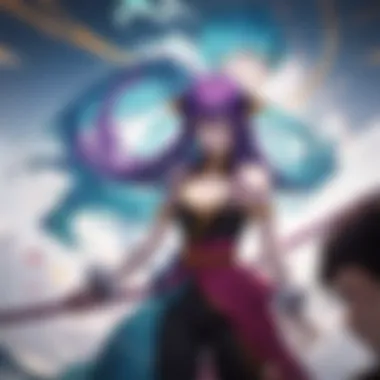

At the core of Yu Yu Hakusho lies the exploration of life, death, and the afterlife. The protagonist, Yusuke Urameshi, begins his journey after dying in an unexpected accident. His return to the living world as a Spirit Detective highlights the intricate relationship between life and death. The series prompts viewers to question what it means to truly live, as characters navigate the consequences of their actions in both realms.
The depiction of the underworld, including the various tests and trials that souls face, adds another layer to the narrative. It emphasizes the concept of karma and responsibility, as individuals must reckon with their past decisions. Through this framework, Yu Yu Hakusho encourages an examination of existence itself, highlighting that life is not just about survival but also about choices that shape one’s legacy.
Friendship and Rivalry
Friendship and rivalry are central themes intertwined in the character dynamics throughout the series. The bond between Yusuke, Kuwabara, Kurama, and Hiei illustrates the importance of loyalty and camaraderie. These friendships face tests through challenges and conflicts, reinforcing the notion of teamwork and mutual support in overcoming adversity.
Conversely, rivalry also plays a crucial role, especially in the relationships between Yusuke and powerful adversaries like Toguro. Such rivalries propel character growth and development, as overcoming a worthy opponent can lead to greater self-awareness and strength. It reflects the idea that competition can be a catalyst for personal growth while also highlighting the complexities of human relationships.
Morality and Redemption
The theme of morality and redemption is intricately woven throughout Yu Yu Hakusho. Characters grapple with their past misdeeds, offering reflections on guilt and the desire for redemption. The series presents a moral landscape where characters are not merely 'good' or 'evil'; instead, they navigate shades of gray that add depth to their motivations.
This complexity is epitomized in characters like Hiei and Kurama, who each have traumatic pasts and dark secrets. Their paths to redemption are significant, illustrating that the journey towards becoming a better person is fraught with hurdles. The moral dilemmas faced by characters invite the audience to reflect on the implications of their choices and the possibility of atonement, reinforcing the notion that change is attainable but requires effort and introspection.
"The essence of Yu Yu Hakusho lies not just in its battles, but in the profound truths it reveals about life, relationships, and the quest for redemption."
Art and Animation Style
The art and animation style of Yu Yu Hakusho is an essential component that significantly contributes to its narrative and emotional impact. The distinct visual execution helps establish the tone of the series and enhances the viewer's connection to the characters and their experiences. This section will delve into the importance of art and animation in this anime classic, with a focus on character design and action sequences.
Character Design and Visual Identity
Character design in Yu Yu Hakusho is notable for its individuality. Each character is crafted with characteristics that not only reflect their personalities but also their growth throughout the series. Yusuke Urameshi, for instance, embodies the attributes of a typical rebellious youth, which evolves as he confronts his own challenges. The rugged design and somewhat scruffy appearance resonate with viewers, making him relatable and grounded.
Furthermore, secondary characters like Kurama and Hiei showcase unique traits that are visually represented through distinct clothing and hairstyles. Kurama’s elegant and refined look in contrast to Hiei’s more demonic appearance underscores their complex personalities and roles within the story. The diverse designs contribute to a rich visual identity that supports storytelling. In many frames, color choices reflect emotional states, enhancing scenes where drama or conflict occurs.
Action Sequences and Fighting Styles
The action sequences in Yu Yu Hakusho are remarkably well-executed. The animation during battle scenes displays fluidity that captures dynamic movements. Each fight is choreographed with a sense of realism, emphasizing technique and strategy over mere brute strength. The unique fighting styles of characters further enhance these sequences.
Yusuke’s formidable Spirit Gun is visually striking and represents his character's evolution and mastery over his abilities. Hiei’s use of the Dragon of the Darkness Flame is another example of how the animation elevates the stakes of the confrontation. Each technique is not only a visual spectacle but also carries implications for character development and plot progression.
In summary, the art and animation style in Yu Yu Hakusho serve as more than just aesthetic enhancements. They function as vital narrative tools that enrich the audience's experience and understanding of characters and their journeys. The integral relationship between visual presentation and storytelling is evident in every episode, solidifying Yu Yu Hakusho's status as a timeless piece in anime history.
Soundtrack and Audio Elements
The soundtrack of Yu Yu Hakusho plays a critical role in conveying the emotional undertones and enhancing the narrative. A well-composed score can elevate scenes, providing depth that complements the story's structure. The audio elements are not merely background noise; they are integral to the audience's experience and understanding of the characters and themes.
Composition and Mood
The music in Yu Yu Hakusho is characterized by its diverse composition style. From powerful orchestral scores during intense battles to soft melodies that underscore moments of reflection, the soundtrack mirrors the emotional landscape of the series. Composers have skillfully crafted each piece to resonate with the events unfolding on screen.
Specific tracks intensify the stakes of confrontations. For example, the song accompanying Yusuke's pivotal battles is intense and adrenaline-pumping, fostering engagement and excitement. Meanwhile, softer background pieces effectively underscore slower, more emotional moments, creating a poignant atmosphere that resonates with viewers. The deliberate use of sound supports the series' themes of friendship, sacrifice, and personal growth.
"Without its evocative soundtrack, Yu Yu Hakusho would lose a significant aspect of its emotional depth."
Voice Acting and Characterization
Voice acting is another pivotal element in the show's overall presentation. The cast brings life to the characters, infusing them with personality and nuance. Each performance is crucial in defining how audiences perceive the characters' motivations and emotions.
The voice actors, such as Nozomu Sasaki (Yusuke) and Laura Bailey (Botan), deliver performances that range from comedic to deeply dramatic, aligning perfectly with the script's context. Their ability to convey subtleties—fear, joy, frustration—enhances the relatability of the characters. For instance, the energy in Yusuke's lines often reflects his brash and rebellious nature, reinforcing his role as the quintessential anti-hero.
In contrast, characters like Hiei often require a more subdued, yet intense, vocal approach. This portrayal not only highlights their complexities but also invites the viewers to explore the layers within these characters. The voice acting, therefore, adds another dimension to Yu Yu Hakusho, ensuring that each character feels unique and memorable.
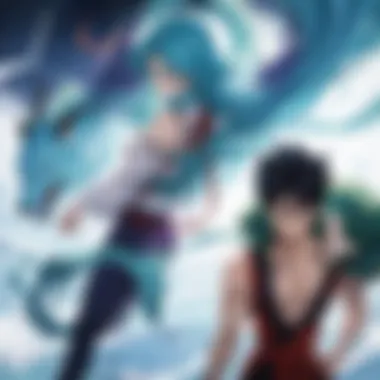

Impact on Pop Culture
The impact of Yu Yu Hakusho on pop culture is profound and multifaceted. It has set a precedent in the anime genre that continues to influence creators and enthrall audiences. The series brought forth a dynamic blend of action, humor, and emotional depth, laying the groundwork for future shows. Its popularity extended beyond Japan, solidifying its status in international anime culture.
Influence on Future Anime Works
Yu Yu Hakusho has significantly impacted subsequent anime works. Its unique narrative structure inspired many creators, encouraging them to blend genres and explore complex themes. Shows like Naruto and Bleach drew from its format, combining action with a deep exploration of character arcs. Key elements include:
- Character Development: The detailed growth of characters like Yusuke Urameshi has set a benchmark for protagonist development in anime.
- Thematic Depth: The incorporation of darker themes surrounding life and death has openedup new narrative possibilities.
- Diverse Fighting Styles: The variety of combat techniques in the series has influenced how battles are choreographed and animated in later shows.
Merchandise and Fandom
The franchise’s merchandise and fandom demonstrate its widespread influence. From figurines to video games, Yu Yu Hakusho has spawned a vast array of products that cater to its dedicated fanbase. This commercial success is driven by several factors:
- Community Engagement: Fans actively engage in discussions online, sharing theories and artwork on platforms like Reddit and Facebook.
- Conventions and Events: Yu Yu Hakusho continues to feature prominently in anime conventions, where fans celebrate their love through cosplay and panels.
- Collectibles: Limited edition items often see high demand, showcasing the loyal following and the ongoing relevance of the series.
"The cultural resonance of Yu Yu Hakusho is not just about nostalgia, but a continuing influence that shapes the landscape of anime today."
In summary, the impact of Yu Yu Hakusho on pop culture is notable. Its pioneering elements have left an indelible mark on the anime industry and fostered a vibrant community of fans that continues to thrive.
Legacy and Ongoing Relevance
The legacy of Yu Yu Hakusho remains significant in the anime medium. This legacy is defined by its unique storytelling, complex characters, and the handling of universal themes. The series has not only influenced its contemporaries but also new generations of anime. Its characters delve into psychological depth and moral dilemmas, establishing an emotional bond with viewers.
Relevance in Today’s Anime Landscape
Yu Yu Hakusho still resonates within the anime space. This relevance is partly due to the rise of shonen genre, where the balance of action, drama, and character development is crucial. Current anime such as Demon Slayer: Kimetsu no Yaiba and My Hero Academia share thematic similarities, reflecting the tug-of-war between good and evil, much like Yusuke's journey.
- Character Archetypes: The series established archetypes that persist in anime storytelling, such as the reluctant hero and the rival. Yusuke Urameshi's growth, along with the dynamic relationships, influences how new characters are developed.
- Themes of Redemption: The exploration of redemption and morality remains relevant. Modern series still tackle these subjects, echoing the lessons imparted through characters like Hiei and Kurama.
- Cultural Touchstones: The incorporation of Asian mythologies in today's shows can be tied back to the influence of Yu Yu Hakusho, which presented a rich tapestry of cultural references.
Retrospectives and Anniversaries
The impact of Yu Yu Hakusho is often recognized during retrospectives and anniversaries. These events provide an opportunity to revisit the series and reflect on its contributions to anime.
"In the realm of anime, every classic holds a mirror to the viewer's emotions and thoughts, as Yu Yu Hakusho does for so many."
Fans celebrate anniversaries with discussions on platforms like Reddit, where communities engage in debates about their favorite arcs or characters. Major milestones often coincide with releases of remastered versions or special events. This ensures that the show's influence is not only remembered but also reimagined for today’s audiences.
- Special Events: Comic conventions sometimes hold panels dedicated to discussing the series, emphasizing its cultural significance.
- New Releases: Companies like Funimation often re-release the series for both new and old fans to enjoy, keeping the content fresh in public consciousness.
- Legacy Products: Merchandise, such as figures and collectibles, shows the ongoing commercial impact of the series, attracting collectors and fans alike.
Overall, the legacy of Yu Yu Hakusho is robust, shaping the landscape of anime while being reinterpreted and appreciated by new audiences.
Epilogue
The conclusion of this article encapsulates the significance of Yu Yu Hakusho in the anime context and beyond. It emphasizes the show's multilayered storytelling, character developments, and thematic resonance. A robust conclusion draws together the various threads explored throughout the piece, allowing readers to reflect on the show’s enduring qualities and influences.
The Lasting Impact of Yu Yu Hakusho
Yu Yu Hakusho is not just a series; it is a cultural touchstone. Its influence extends beyond its original airing, continuing to affect anime creators and fans alike. The show redefined the shonen genre, setting benchmarks for narrative complexity and character arcs.
- Character Dynamics: The relationships between characters, especially between Yusuke and his friends, highlight personal growth and emotional depth. This complexity invites viewers to engage more deeply as they identify with characters and their struggles.
- Themes of Morality: The series grapples with concepts of life and death, and the moral ambiguities that accompany these themes. This has prompted discussions in academic circles about ethical reasoning in media.
- Legacy Through Adaptations: The continued interest in Yu Yu Hakusho includes remakes, spin-offs, and merchandise, underscoring its place in pop culture. This aspect shows its adaptability and ongoing appeal across generations.
"Yu Yu Hakusho represents a vital link between traditional storytelling and modern anime; it continues to inspire and challenge the expectations of what anime can accomplish."
Final Thoughts on the Series
In summary, Yu Yu Hakusho serves as a bridge between generations of anime enthusiasts. Its intricacies, from character arcs to philosophical inquiries, allow for both entertainment and intellectual discussion.
As both a fan and a scholar, it is critical to view Yu Yu Hakusho not as a relic of the past but as a living, breathing entity that still resonates today. The ways in which it shaped narrative structures and character development in anime is profound, serving both to entertain and provoke thought.
The series invites continuous reinterpretation and discussion. Its blend of action, humor, and poignant moments ensures that it retains a special place in the hearts of many. The journey through the worlds of Yu Yu Hakusho stands as a remarkable example of storytelling in anime.
By reflecting on its legacy, fans and new viewers alike can appreciate the layers of depth this series provides, ensuring that Yu Yu Hakusho will remain a subject of admiration for years to come.


